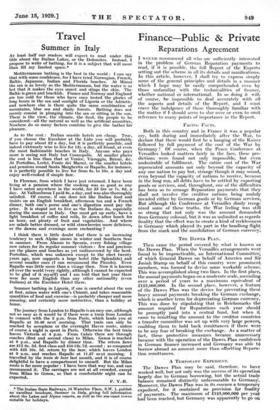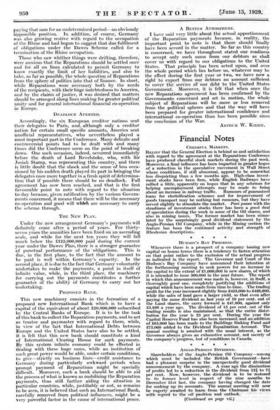Finance—Public & Private
Reparations Agreement
I wouLD recommend all who are sufficiently interested in the problem of German Reparation payments to read, if it is possible, the full Report of the Experts setting out the scheme in all its details and ramifications. In this article, however, I shall try to express simply some of the general principles and details in a manner which I hope may be easily comprehended even by those unfamiliar with the technicalities of finance, whether national or international. In so doing it will; of course,' be impossible to deal accurately with all the aspects and details of the Report, and I must crave the indulgence of those thoroughly familiar with the matter if I should seem to slur over or even to omit reference to many points of importance in the Report.
FACING FACTS.
Both in this country and in France it was a popular cry, both during and immediately after the War, to declare that there would first be a hanging of the Kaiser followed by full payment of the cost of the War by Germany Of course, when the Peace Conference at Versailles looked matters fairly in the face, these pre- dictions were, found not only impossible, but even undesirable of fulfilment. The entire cost of the War represented amounts not, only beyond the capacity of any one nation to pay but, strange though it may sound, even beyond the -capacity of nations to receive, because in the long run, all debts .have to be settled by exporting gOods or seryices, and, throughout, one of the difficulties has been so to arrange Reparation payments that they shall not involve the creditor nations being unduly invaded either by German goods or by German services But although the Conference at. Versailles dimly recogl iiized some of these truths, the War feeling was still so strong that not only was the amount demanded from Germany colossal, but it was so unlimited as regards finality that the effect was to create a kind of recklessness in Germany which played its part in the headlong flight from the mark and the annihilation of German currency.
THE DAWES PLAN.
Then came the period covered by what is known as the Dawes Plan. VVhen the Versailles arrangements were found to be impracticable, an International Committee; of which General Dawes on behalf of America and Sir Josiah Stamp on behalf of this country were prominent members, was formed to devise some workable scheme. This was accomplished along two lines. In the first place, the annual payments began on a moderate scale, ascending over a period of years to a maximum equivalent of £125,000,000. In the second place, however, a feature of the Dawes Plan was the device for preventing these heavy annual payments breaking the German exchange, which is another term for depreciating German currency. This was done by stipulating that in Reichsmarks the amount required for Reparations each year shotll4 be promptly 'paid into a central fund, but when it came to remitting the amount to the creditor countries a transfer committee was set up with very large powers, enabling them to hold back remittances if there were to be any fear of breaking the exchange. As a matter of fact, these protective measures became unnecessary because with the operation of the Dawes Plan confidence in German finance increased and Germany was able tor) borrow abroad an amount more than offsetting Repara- tion remittances.
A TEMPORARY- EXPEDIENT.
The Dawes Plan may be said, therefore, to have worked well, but not only was the success of its operation largely due to German borrowing, but the actual trade balance remained distinctly unfavourable to Germany. Moreover, the Dawes Plan was in its essence a temporary expedient, for it contained no provision for finality of payments. The maximum of £125,000,000 per ye4 had-been reached, but Germany was apparently to go on paying that sum for an undetermined period—an obViously- impossible position. Iii addition, of course, Germany was also growing restive with regard to the occupation of the Rhine and had begun to suggest that due fulfilment of obligations under the Dawes Scheme called for a termination of the Rhine occupation.
Those who saw whither things were drifting, therefore, Were anxious that the Reparations should be settled once and for all on lines calculated to permit Germany to know exactly the limit of her liabilities, and also to take, as fai as possible, the whole question of Reparations from the, sphere of politics into that of 'finance. In short, while Reparations were necessary both by the nee& Of the recipients, with their huge indebtedness to America, and by the clainis of justice, it was desired-that matters should be arranged along lines making for greater political' amity and for general international financial Co-operation in Europe.
DEADLOCK AVERTED. _ Accordingly, the six European creditor nations sent their delegates to Paris, and, although. only a creditor nation for certain small specific amounts, America sent Unofficial representatives, who nevertheless played a most important part in the Conference. Many delicate and controversial points had to be dealt with and many times did the Conference seem on the point of breaking down. One such occasion, indeed, occurred immediately before the death of Lord Revelstoke, who, with Sir Josiah Stang), was representing this country; and there is little doubt that the shock and the sense of loss occa- sioned by his sudden death played its part in bringing the delegates once more together in a fresh spirit of determina- tion that if possible there should be no deadlock. Full agreement has now been reached, and that is the first favourable point to note with regard to the situation to-day because, given ratification by the various Govern- ments concerned, it means that there will be the necessary bo-operation and good will whfeh are necessary to carry the scheme through.
THE NEW PLAN.
Under the new arrangement Germany's payments will definitely cease after a Period' of years. For thirty- seven years the annuities have been fixed on `an ascending scale, and while for the -next ten years they will fall much below the 105,006,000 paid during the current year under the Dawes Plan, there is a stronger guarantee of punctual performanee of the 'obligations. This is due, in the first place, to the fact that the amount to be paid is well within Germany's capacity. In the second place, it is due to the fact that Germany voluntarily undertakes to make the payments, a point in itself of infinite value, while, in the third place, the machinery for carrying out the payments nonatitutes a further guarantee of the ability of Gerniany to carry out her undertaking.
PROPOSED BANK, This new machinery consists in the formation of a proposed new International Bank which is to have a capital of the equivalent of about £20,000,000 subscribed by the Central Banks of Europe. It is to be the task of this bank to collectthe Reparation payments, and to act as trustee and paymaster with regard to them, while, in view of the fact that International Debts between Europe and the United States have also to be settled, it is felt that this new bank should constitute a kind of International_ Clearing House for such payments. By this system infinite economy could be effected in dealing with these huge sums, while an institution of such great power would be able, under certain conditions, to give—strictly on business lines—credit assistance to Germany during particularly awkWard periods when prompt payment of Reparations might be specially difficult. Moreover, such a bank should be able to aid the process of what is known as mobilizing the Reparation payments, thus still further aiding the situation in particular countries, while, justifiably or not, as remains to be seen, it is believed that such an International Bank, carefully removed from political - influences, might be a very powerful factor in the cause of international peace. A BETTER ATMOSPHERE.
I have said very little about the actual apportionment of the Reparation payments because, in reality, the important point to note is that there should finally have been accord in the matter. So far as this country is concerned, we have throughout stated our readiness to accept only such sums from our debtors as shall cover us with regard to our obligations to the United States. That principle has been acted upon, and over the whole period which lies before us, whatever may be the effect during the first year or two, we have now a right to expect from our debtors an amount sufficient to cover the service Of our debt to the United States Government. Moreover, it is felt that when once the new Reparations agreement has been confirmed by the Governments, concerned and set in motion, the whole subject of Reparations will be more or less removed from the political spheres and that the way will have been prepared for greater international confidence and international co-operation than has been possible since the conclusion of the War. ARTHUR W. KIDDY.







































 Previous page
Previous page